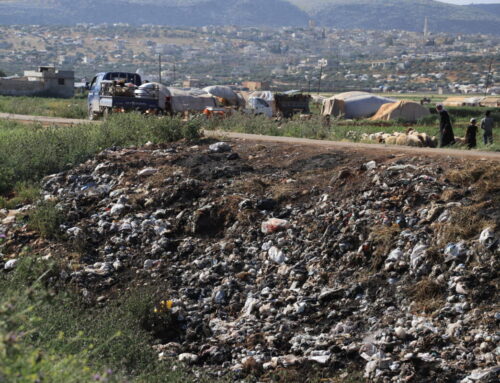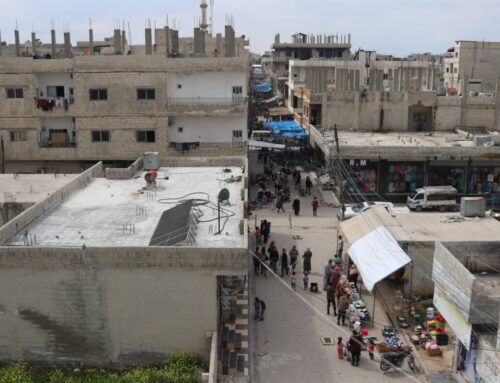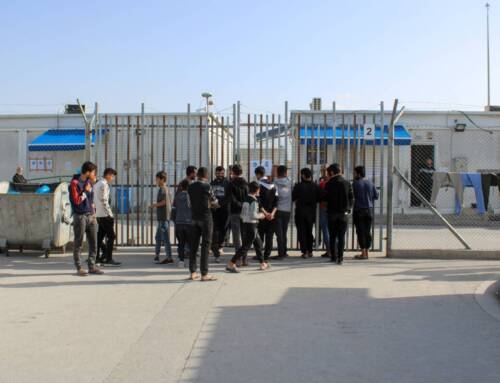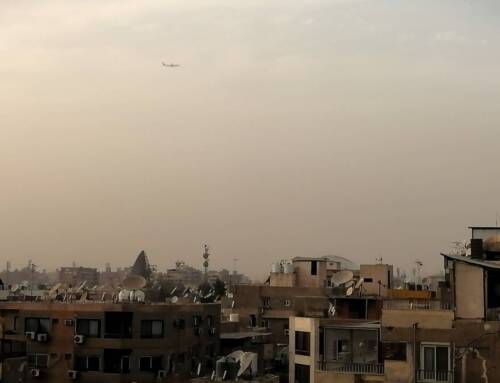Navigating new lives under Assad, East Ghouta students renew dreams of a university degree
Young Syrians walk through downtown Damascus in May. Photo by […]
12 July 2018

AMMAN: In early July, 24-year-old Sonya al-Hassan left her hometown in the formerly rebel-held eastern Damascus suburbs for the first time after five long years of punishing siege by pro-government forces.
The elementary school teacher set out in a shared taxi from her home in Douma, once the largest and most important city in the tightly encircled East Ghouta rebel enclave, and made her way to downtown Damascus. There, she began the registration process for a place at Damascus University in the hopes of studying for a degree in education.
It was a trip that seemed unthinkable to her just months ago.
“When you get to the university, you see thousands of students who are studying and registering—just living their lives normally,” al-Hassan tells Syria Direct, “but [in East Ghouta] we spent the past five years thinking about food, water and just staying alive.”
For the first time in years, al-Hassan and other young Syrians from the Ghouta are cautiously revisiting the capital to register for university courses, or to finish long-delayed degrees, following an official decree passed by the Syrian government’s Higher Education Council last month that allows them to “settle their statuses” as students.
Under Syrian law, university students who go more than one year without attending classes are not eligible to graduate from the country’s state-run universities. But last month’s decree gave students a new chance at higher education by stating that those recently “freed from besieged areas” can finish their degrees despite having been cut off from government-held territory for several years.
For prospective students like al-Hassan, who graduated high school but never had the chance to register for university due to the war, the decree also means returning to education after years without formal study.
Those years were spent under bombs and, towards the end, within an airtight blockade before government forces finally seized East Ghouta in April.
Al-Hassan is among the hundreds of thousands of Ghoutans who then faced a difficult choice: to board evacuation buses to opposition-held northwestern Idlib province or stay home and navigate an uncertain new life under Assad after years of opposition rule.
For young Ghoutans who chose to stay, the June decree is a welcome change allowing them to finally graduate from university after years of siege crumbled any hopes of a higher education. Studying means career prospects and, for young men, obtaining an official university ID, which can postpone the mandatory, two-year military service required of all Syrian men aged 18 to 42.
Women attend a state-sponsored festival in the East Ghouta city of Douma in May. Photo courtesy of Louai Beshara/AFP/Getty Images.
“When I’m registered, I can get a university ID card and many security problems are solved for me—no conscription, no [army] reserves,” Samer Yasseen, one prospective student from East Ghouta’s Douma, tells Syria Direct.
Yasseen, 27, earned his high school diploma in 2012—the year before the Syrian government’s devastating siege over East Ghouta began.
Trapped in East Ghouta, Yasseen could not cross over government lines to pursue a university degree in Damascus, despite living just a 12-kilometer car ride away.
Instead, he and other young Ghoutans enrolled in unaccredited online universities as a last resort, and at the height of the government’s crippling siege and bombing campaign over Ghouta earlier this year, many simply sat at home with spotty electricity and nothing to do as airstrikes and shells rained down.
Now, Yasseen plans to enroll in university for the first time before the annual deadline in September. And, although male students can still be called up to the army after graduating, the thought of going to university feels to him like a “return to life” after years under siege.
But the registration process is not without risks. It means visiting the registrar’s office at Damascus University and filling out forms indicating his preferred degree and which state-run university he wants to enroll in—a process that takes several days and more than one trip to Damascus.
Until Yasseen gets the coveted university ID card and starts studying again, he worries about leaving Douma to register at Damascus University in the city center. Along the highway to central Damascus are a slew of government checkpoints where Yasseen fears he could be seized for military conscription before he gets the chance to register.
“If I were able to go register [for a place at university] without being conscripted at the checkpoints, I’d be able to get my documents together and go to the registration office,” Yasseen tells Syria Direct from Douma. But the multi-day registration process means more than one nervous trip along the checkpoint-ridden highway to Damascus.
Just months ago, that highway was part of a deadly frontline between opposition fighters in Ghouta and pro-government forces, then unleashing an aerial and ground campaign to recapture the besieged enclave. An all-out assault by Damascus and its allies devastated the already starved and bombed-out pocket for months, while rebels sporadically responded with shelling and mortar-fire on nearby government-held territory.
The military offensive spelled disaster for hundreds of thousands of civilians.
Ghouta residents sheltered from the onslaught by hiding-out for days on end in makeshift bomb shelters set up in the basement storage rooms of their apartment buildings. A network of underground tunnels that once brought in food and medicine were shut down. In at least two instances between October and April, government bombs hit school buildings with young children inside. Depression and anxiety were reportedly widespread.
By March, at least one thousand of Ghouta’s estimated 400,000 residents had been killed, Doctors Without Borders reported.
Women gather for a state-sponsored festival in Douma in May. Photo courtesy of Louai Beshara/AFP/Getty Images.
During the onslaught and the years of siege beforehand, Douma resident Abd a-Rahman Murad worked as an employee with local civil society organizations, providing aid to civilians within Ghouta.
Murad, in his 20s, was just one year from graduating at the state-run university’s Institute of Mechanical and Electrical Engineering in 2012. But as violence increased and government forces encircled East Ghouta, he could no longer reach the city center for his exams. His dream of graduating from Damascus University with a degree in mechanical engineering became a distant memory.
A year went by, and then it was six. Murad became ineligible to finish his degree or transfer any of his credits, according to Syrian law.
He had “gone back to zero,” Murad tells Syria Direct from Douma.
But since last month’s decree, Murad is cautiously starting where he left off. He travels from Douma to Damascus University several days each week for summer courses to finish the fifth, and final, year of his mechanical engineering degree. It has been almost ten years, Murad says, since he first began his studies.
Murad was also wary of making the checkpoint-laden trips to Damascus, and of starting again in his program a full six years after he left. “But I told myself: ‘There’s only one year left until I’m done’,” he says.
Despite the prospect of conscription on the near horizon, and upcoming advanced exams, Murad tells Syria Direct he is happy with his decision for now.
“It’s amazing to return,” he says. “I thought it would be impossible.”







